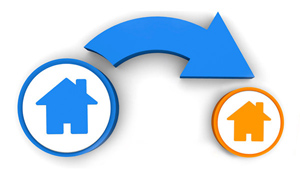Consider these strategies from HGTV when putting your elderly parent’s home on the market to get the best sell price.
Tips to Selling Your House for the Most Money
1. Price it Right to Begin With.
 How many houses have you driven by with a “Reduced” sign slapped over the For Sale Sign. The best approach is to start out with the right price – a price 5% to 10% less than what your house is valued, which attracts hordes of buyers. A bidding war will ensues, driving the price over what it’s worth, which means more money in your parent’s pocket. It’s a risk all too many sellers aren’t willing to take, but right now, it’s your best strategy.
How many houses have you driven by with a “Reduced” sign slapped over the For Sale Sign. The best approach is to start out with the right price – a price 5% to 10% less than what your house is valued, which attracts hordes of buyers. A bidding war will ensues, driving the price over what it’s worth, which means more money in your parent’s pocket. It’s a risk all too many sellers aren’t willing to take, but right now, it’s your best strategy.
2. Create the Illusion of Storage Space.
We all want more space because no matter how many times we declutter and throw things away, we end up with more ‘stuff’. Buyers look for big closets, expansive attics and more cabinet space. To create the appearance of more space, pack away half the items in closes, shelves and cabinets, and then tidy the remaining contents.
3. Stage to Impress.
Rearrange furniture to make the rooms look larger, pack away personal affects, add fresh flowers and candles, repaint walls in a neutral color, etc. And it’s important to have the staging complete just before you list online, where 90% of buyers look first, according to Realtor.com.
4. Let there Be Light.
Buyers want lots of light – natural or otherwise. It makes a room seem more open and airy. Make sure all the light bulbs throughout your house are working, dust lamp shades – replace them if they’re dense and dark. Remove curtains, wash windows and keep window blinds open. If you have trees or shrubs obstructing windows, trim them back.
5. Find the Right Agent.
You want someone experienced, especially experienced in your particular neighborhood. Select an agent that uses all the social media and technical tools of the trade to help get the most exposure for your parent’s house. Your Next Move specializes in senior relocation and transition and matches you with two Realtors in your area who will provide you with a price opinion on your help, then review the price options with you to help you select the agent who best suits your needs.
Top 10 Tricks of the Trade When it Comes to Selling Your House – Part II
Your Next Move can help you locate the perfect senior housing for your aging loved one. Our team of relocation specialists are also with you through every step of the transition process including home sale, downsizing, estate sales and moving household goods.
If you are interested in further information you may contact us below. LIKE us on Facebook and follow us on Twitter to get the most current communication on the subject of senior relocation. Please join our mailing list.
Your Next Move, Easing Your Senior Transition
Julie Kopetsky, President
www.yournextmovenc.com
919-601-8203
Julie.kopetsky@yournextmovenc.com
 Just this year, a new Federal Housing Administration reverse mortgage program can help retired homeowners relocate or downsize to a new home without paying closing costs twice or giving up all their savings, even while they’re still in their existing property.
Just this year, a new Federal Housing Administration reverse mortgage program can help retired homeowners relocate or downsize to a new home without paying closing costs twice or giving up all their savings, even while they’re still in their existing property.  Determining whether or not to sale your family home and move into something smaller in retirement is difficult. And with so many mixed messages out there when it comes to downsizing, it’s enough to make even the most well-prepared logical person question their choice. The easy answer is, not everybody should downsize. Location, priorities, health, and financial obligations are important factors to consider. So, should you downsize or stay put? Ask yourself these questions to help you make an informed decision.
Determining whether or not to sale your family home and move into something smaller in retirement is difficult. And with so many mixed messages out there when it comes to downsizing, it’s enough to make even the most well-prepared logical person question their choice. The easy answer is, not everybody should downsize. Location, priorities, health, and financial obligations are important factors to consider. So, should you downsize or stay put? Ask yourself these questions to help you make an informed decision.  Despite a mixed performance in 2013, the Triangle Real Estate market is making strides in the right direction in 2014, as inventory levels diminish and new housing permits are on the rise. So for those of you thinking about downsizing, now may be the time to finally put your house on the market. But the upswing in the market also means more homes going up for sale, so you need to stay ahead of the competition. Make the best impression possible for a wide range of potential buyers by staging your home.
Despite a mixed performance in 2013, the Triangle Real Estate market is making strides in the right direction in 2014, as inventory levels diminish and new housing permits are on the rise. So for those of you thinking about downsizing, now may be the time to finally put your house on the market. But the upswing in the market also means more homes going up for sale, so you need to stay ahead of the competition. Make the best impression possible for a wide range of potential buyers by staging your home.  Home prices and home size, along with new construction permits, decreasing inventory levels, and a plunging unemployment rate, are making the Triangle-area a superb place to live. Nerdwallet looked at the 59 cities in North Carolina with populations greater than 15,000 to find out which offer the best value for potential buyers. Their analysis answered three main questions: Are homes available? Can people afford to live there? Is the area growing? The answers, yes, yes and yes, put 6 of our towns in the spotlight, with Holly Springs receiving the top-rated #1 honor. .
Home prices and home size, along with new construction permits, decreasing inventory levels, and a plunging unemployment rate, are making the Triangle-area a superb place to live. Nerdwallet looked at the 59 cities in North Carolina with populations greater than 15,000 to find out which offer the best value for potential buyers. Their analysis answered three main questions: Are homes available? Can people afford to live there? Is the area growing? The answers, yes, yes and yes, put 6 of our towns in the spotlight, with Holly Springs receiving the top-rated #1 honor. .